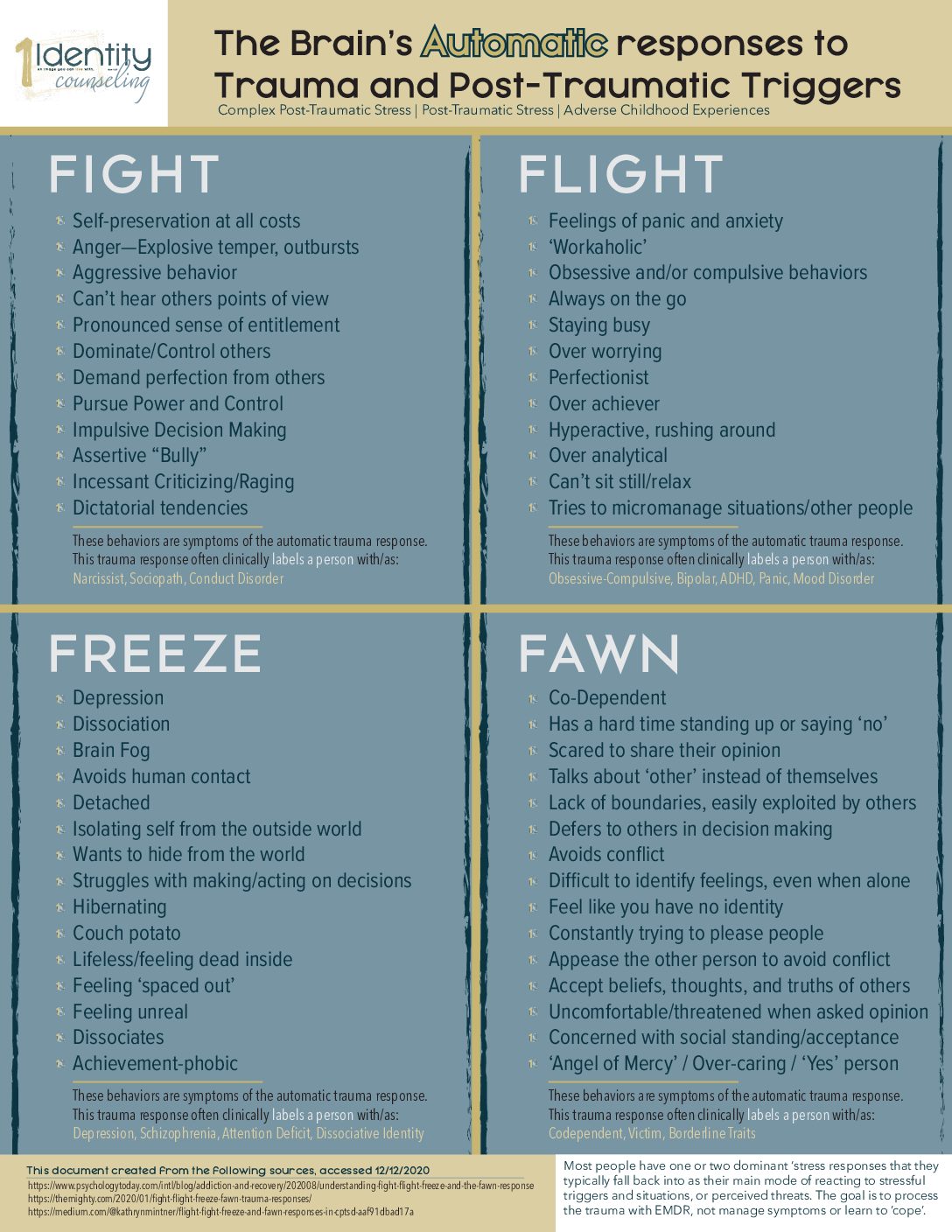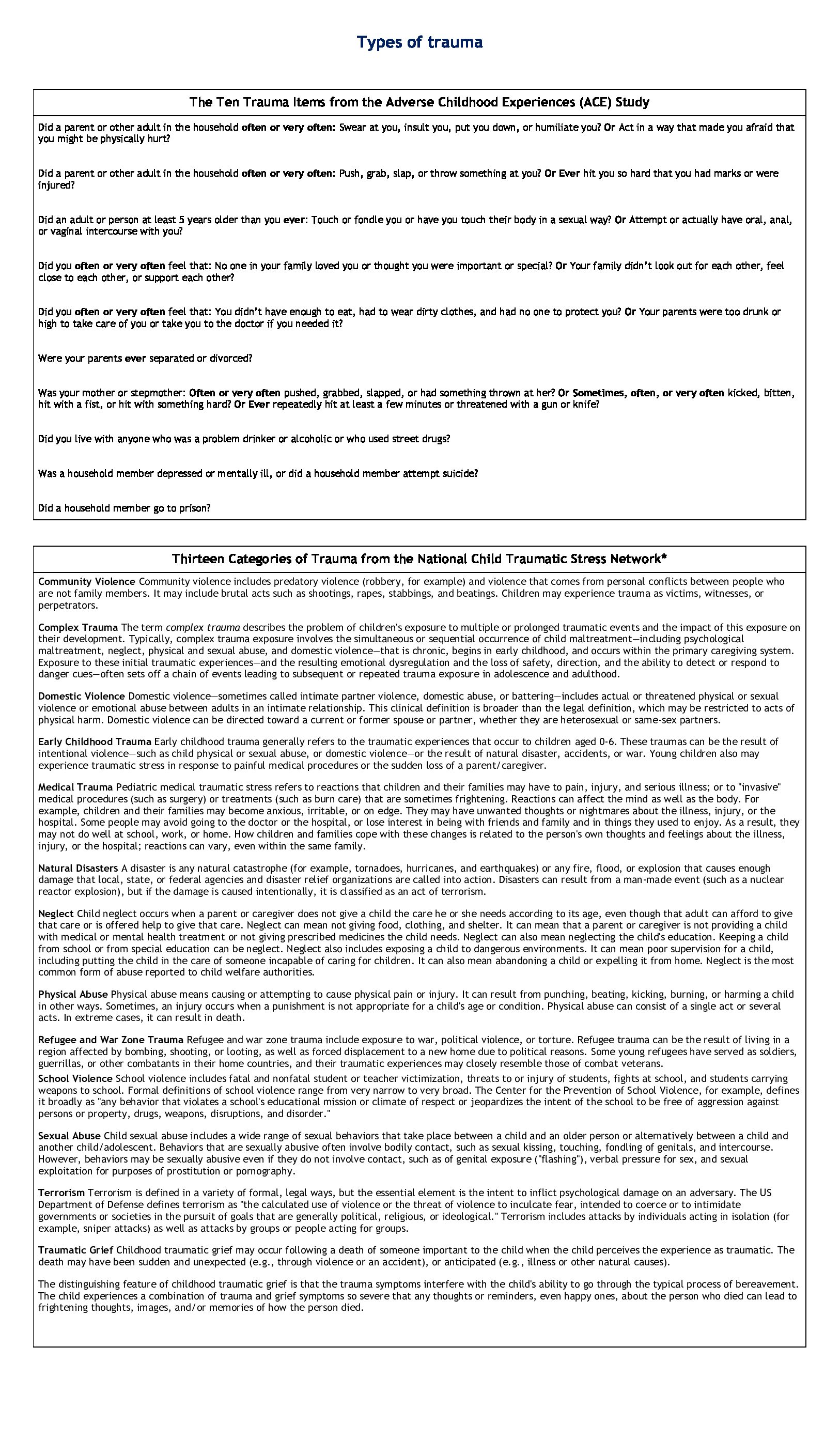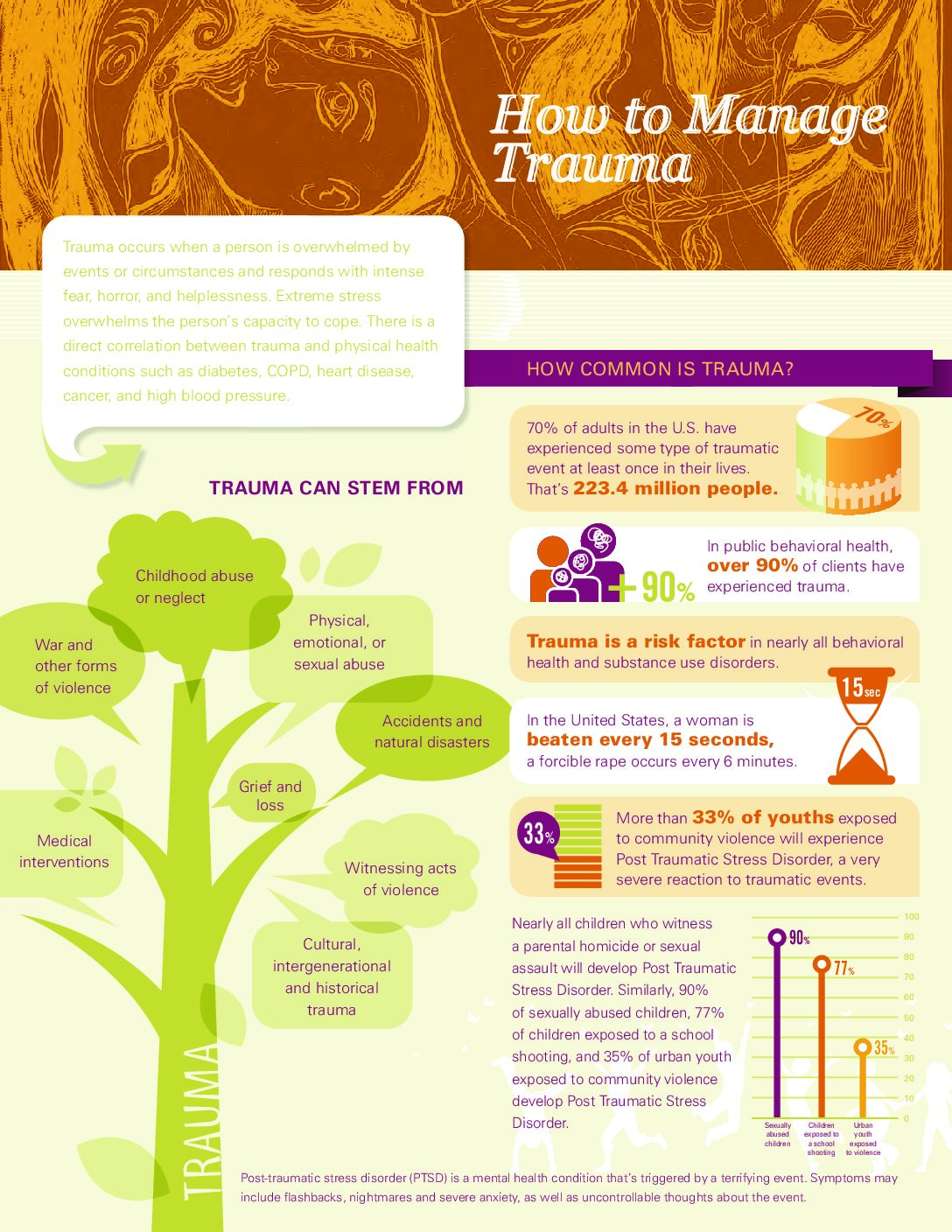Every last one of us is affected by trauma. The National Council of Mental Wellbeing estimates that 70% of adults in the U. S. have experienced at least one traumatic event in their lifetimes. Those who have not experienced trauma directly are often exposed to the byproducts of trauma’s effects on their friends, family, loved ones, and even co-workers. Many have also experienced trauma indirectly through the process of intergenerational trauma.
Trauma experienced during childhood has the most devastating effects.
Nearly all children who witness a parental homicide or sexual assault will develop Post Traumatic Stress Disorder (PTSD). Similarly, 90% of sexually abused children develop PTSD.
Childhood is the time when mental development takes place, setting the foundation for success in adulthood. Multiple abilities are developed throughout a child’s development including Cognition, Attention, Perception, Personality, Observation, Memory, Imagination, Thoughts (like schema, mindset, and worldview), Social-Emotional Skills (like social behavior), intellectual skills (like problem-solving and innovation), Language Skills (like talking, reading, and writing). When trauma occurs during this period of mental development it can alter any one of these skills and result in maladaptive coping strategies which when extreme, persistent, or span a number of developmental skills can result in mental illness experienced throughout the person’s life.
Fortunately, the human brain is plastic throughout a person’s lifetime (although this plasticity drastically decreases in adolescence, making change more difficult later in life). Plasticity throughout life means that you can heal and change any harmful behaviors that were learned because of past traumas. These behaviors, despite being toxic to your relationships, helped the child survive the situation and are nothing to be ashamed of. Considering the fact that nearly 64% of children will experience trauma during their childhood (labeled as Adverse Childhood Experiences or ACE by researchers), along with traumas not included in the ACE assessment, intergenerational trauma, and neglect, it’s safe to say that the majority of people have some residual maladaptive coping strategies that have followed them into their adult lives. I think it’s safe to say that we’re all a little crazy.
Unfortunately, trauma can have us stuck because of denial and other defense mechanisms. Post-trauma is a period of time I like to call Trauma Coma Now. If someone has experienced prolonged and extensive trauma during childhood once they are in a safe environment they go through a period of time where denial, withdrawal, and social isolation can take place. I was stuck in this phase of survival mode until I was nearly 42 years old. Drug and alcohol addiction, sex addiction, gaming addiction, binge-watching TV, and procrastination are primary examples of this phase.
I liken this denial phase to relaxation. Basically, when an individual has lived in environments where they experienced a lot of trauma, and they finally find a safe environment, they just want to relax. To process their trauma would mean additional emotional and psychological distress. Denial is a subconscious defensive mechanism that represses the awareness of the effects of trauma in order to protect us from experiencing further pain.
Eventually, the toxic behaviors and mindsets a person has acquired to help survive the trauma become a recurring theme in their lives and relationships. Some people die never fully healing. My mother died at the age of 56. My sister and I discussed her undiagnosed mental illness after her death. At the time she died, she was in one of her depressive and withdrawn phases. My mother also struggled with symptoms similar to Borderline Personality Disorder (BPD), Bipolar Disorder, and a gambling addiction. At the very least, she had issues with emotional dysregulation and many fawn response coping behaviors. Merely having a mother who suffered from an undiagnosed mental illness can result in her children either integrating those behaviors into their own coping strategies or developing their own coping strategies. This is a good example of how intergenerational trauma happens.
After 19 years of off-and-on trauma, in multiple different environments, and from a variety of abusers, I developed maladaptive coping mechanisms in all of the categories of trauma responses (referred to many times as the 4 F’s, although some researchers posit that there are more than 4 categories). For over 2 decades I lived with these toxic traits, suffering through unhealthy relationships, lost friendships, and interpersonal struggles at work and in college, as well as many fights with my mother. I like to say that I’m blessed for the trauma I endured, and the pain that I experienced as a result of it, because if not for the magnitude of my experience with trauma and pain I felt as a consequence of the numerous toxic trauma responses and behaviors I may have died in denial, like my mother. It saddens me that she was not around to witness the growth and healing that I’ve gone through. Not only would she have been proud of me, but maybe she would have had a chance to heal her own pain and the opportunity to get to know herself at a deeper level.
The following .pdf is from 1 Identity Counseling, a business located in Indiana. It provides the types of trauma response behaviors that can develop in the different trauma response realms.

The National Child Traumatic Stress Network has identified 13 categories of Trauma which I’ve listed below followed by a more detailed PDF containing several links where you can learn more about the subject.
13 Categories of Trauma
- Community Violence
- Complex Trauma
- Domestic Violence
- Early Childhood Trauma
- Medical Trauma
- Natural Disasters
- Neglect
- Physical Abuse
- Refugee and War Zone Trauma
- School Violence
- Sexual Abuse
- Terrorism
- Traumatic Grief
Many researchers have added Racial Trauma to this list. Racial trauma consists of overt and covert racism, bias, prejudice, structural racism, systemic racism, intergenerational trauma (labeled as Post Traumatic Slave Syndrome), and judicial trauma.

When I first realized the magnitude of the long-term effects that my trauma still had on my life I was devastated. I felt as if I didn’t know who I was outside of my trauma. Since that day I have become consumed with understanding trauma from every angle. Thus, the creation of this blog. The impact that trauma has on society as a whole is beyond measure. Some think it’s the most important world issue today. Living in denial of the aftermath of trauma is what I believe keeps us addicted, stuck, disconnected, segregated, and lacking in compassion, understanding, and empathy. It keeps us from fully knowing ourselves. It imprisons us and stops us from pursuing our dreams and reaching our full potential.
Help is available and healing is possible. Although, some people’s trauma is so severe that the damage done to the function and process of the developing brain may never become “normal”. My trauma affected so many aspects of my personality that I sometimes worry that I’m in that category. The process of healing all of my broken parts will be a long and painful journey. Thankfully, we are truly in the midst of a revolution when it comes to understanding the mind. As such, there are many treatments that are effective to help individuals not only resolve their past trauma but to live a happy and healthy life.
Healing trauma is a topic that will be discussed extensively on this site. Along my healing journey, I have come across many individuals who have dedicated their lives to understanding trauma and its effects on the brain and society as a whole. Each perspective contains little gems of wisdom and insight that have helped me not only understand myself better but also understand other people better. It seems like just as I feel like I have a firm grasp on things I find myself stumbling onto yet another perspective, method of therapy, or individual with profound insights into the realm that is Trauma.
I’ll leave you with one of those resources.
Janina Fisher, Ph.D. is a former instructor at Harvard Medical School and a licensed clinical psychologist. She’s worked with some of the best minds in the field including Judith Herman, Bessel van der Kolk, and Pat Ogden. Her contributions to the understanding of the lifelong aftereffects of trauma have helped me face the shame that I’ve felt all my life. The feeling of being “damaged beyond repair” and worthlessness is one of my biggest trauma triggers. The feeling of shame was the source of many of my angry outbursts and fights that I’ve had in my romantic and other relationships. My hope is that it will help you on your journey. On Dr. Fisher’s website, www.janinafisher.com, you’ll find several helpful FREE e-Books that will help you understand your trauma better, as well as several methods to help you heal.


0 Comments